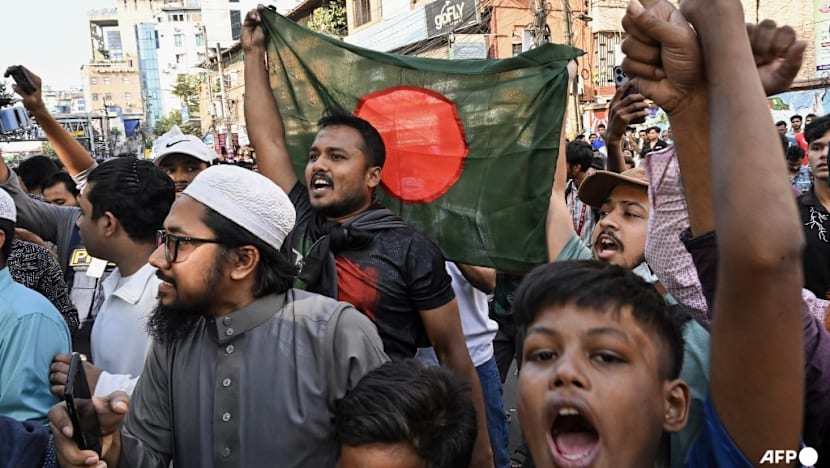Politics
Bangladesh Faces Political Turmoil After Hasina’s Death Sentence

Bangladesh is navigating a turbulent political landscape following a tribunal’s ruling on November 17, 2024, that sentenced ousted Prime Minister Sheikh Hasina to death for crimes against humanity related to a violent crackdown on protests last year. While the verdict appears largely symbolic, given that Hasina currently resides in India, analysts warn it may exacerbate existing divisions within the country and complicate diplomatic relations with India.
Extradition Uncertain
In addition to Hasina, former Interior Minister Asaduzzaman Khan Kamal received a death sentence, and both figures are reportedly in hiding in India. The Bangladesh foreign ministry has requested New Delhi extradite Hasina and Khan, but as of now, India has not responded to this demand. Hasina has condemned the ruling as politically motivated and claims the judicial process was predetermined.
According to Amit Ranjan, a research fellow at the National University of Singapore’s Institute of South Asian Studies, India is likely to weigh its decision against its strategic interests rather than political pressures from Dhaka. Ranjan noted that India maintains close ties with Hasina’s family, complicating the decision on whether to comply with the extradition request. He highlighted that the extradition treaty permits India to refuse requests viewed as politically motivated.
Professor Greg Barton, chair in global Islamic politics at Deakin University, contended that complying with the request could be perceived domestically as a weakness, given Hasina’s history as a close ally of India. He suggested that allowing Hasina to seek refuge in a third country may help defuse tensions between New Delhi and Dhaka, but he remains skeptical that India would extradite her.
Potential for Escalating Violence
The unrest that led to Hasina’s ousting began over a contentious job quota perceived as favoring her supporters. This escalated into widespread protests against a government characterized by allegations of disappearances and extrajudicial killings. A United Nations-led investigation revealed that approximately 1,400 people, including many children, were killed during the violent protests of July and August 2023.
The UN welcomed the tribunal’s ruling as a significant moment for victims of the crackdown but reiterated its opposition to the death penalty. UN human rights chief Volker Turk called on the Bangladeshi government to prioritize national reconciliation and urged all parties to exercise restraint.
In the lead-up to the ruling, reports of violence emerged, including crude bomb explosions and arson against vehicles in Dhaka and other cities. Barton pointed out that while the death sentence is unlikely to be enacted, it raises the stakes for the interim government and could ignite further violence. He anticipates that Bangladesh may experience prolonged unrest, complicating the holding of elections scheduled for February.
Nobel laureate Muhammad Yunus, leading the interim government, faces a precarious situation. Ranjan emphasized that Yunus must avoid replicating the oppressive tactics of Hasina’s administration. In May, the Bangladesh Election Commission suspended the registration of Hasina’s Awami League party, effectively blocking it from participating in the upcoming national elections. Ranjan criticized this move as undemocratic, urging the interim government to differentiate itself from Hasina’s legacy.
Barton added that excluding the Awami League, one of the nation’s two dominant parties, risks alienating a significant portion of the electorate. He proposed a potential compromise—allowing the Awami League to participate but barring its indicted leaders from running.
The political uncertainty extends to Bangladesh’s crucial garment industry, the second largest globally, which is grappling with trade tariffs and declining investor confidence. Barton underscored the importance of public trust and confidence in ensuring the country’s economic stability. He stressed that minimizing protests and maintaining order is vital for Bangladesh to navigate these challenging times successfully.
-

 Lifestyle4 months ago
Lifestyle4 months agoHumanism Camp Engages 250 Youths in Summer Fest 2025
-

 Business4 months ago
Business4 months agoKenvue Dismisses CEO Thibaut Mongon as Strategic Review Advances
-

 Sports4 months ago
Sports4 months agoDe Minaur Triumphs at Washington Open After Thrilling Comeback
-

 Top Stories4 months ago
Top Stories4 months agoColombian Senator Miguel Uribe Shows Signs of Recovery After Attack
-

 Sports4 months ago
Sports4 months agoTupou and Daugunu Join First Nations Squad for Lions Clash
-

 Health4 months ago
Health4 months agoNew Study Challenges Assumptions About Aging and Inflammation
-

 World4 months ago
World4 months agoASEAN Gears Up for Historic Joint Meeting of Foreign and Economic Ministers
-

 Business4 months ago
Business4 months agoOil Prices Surge Following New EU Sanctions on Russia
-

 Entertainment4 months ago
Entertainment4 months agoDetaşe-Sabah Violin Ensemble Captivates at Gabala Music Festival
-

 Entertainment4 months ago
Entertainment4 months agoBaku Metro Extends Hours for Justin Timberlake Concert
-

 Business4 months ago
Business4 months agoU.S. House Approves Stablecoin Bill, Sends to Trump for Signature
-

 Top Stories4 months ago
Top Stories4 months agoRethinking Singapore’s F&B Regulations Amid Business Closures









